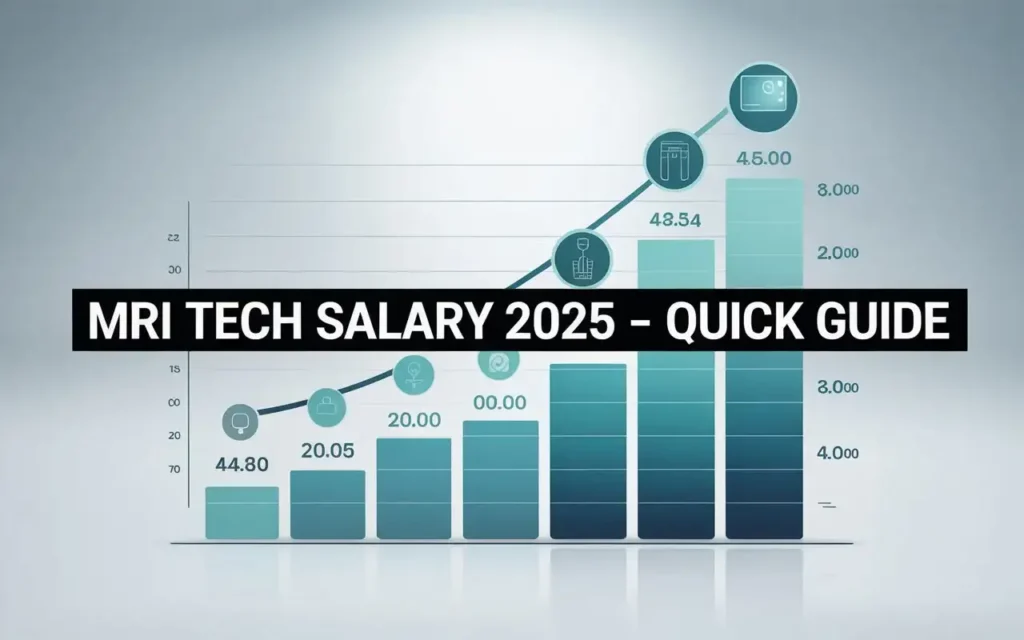Considering a career as an MRI technologist and considering the pay Youre not the only one. With healthcare professions booming MRI tech salary is one of the top searched queries today. And its no wonder—its a giving career on both the emotional and financial levels. In this guide were going to dissect the figures real-world job facts and everything in between to help you gauge what you might make as an MRI tech in 2025.
What Is an MRI Tech Salary
An MRI (Magnetic Resonance Imaging) technologist is a medical technologist working with MRI scanners to produce images of patients internal anatomy. Physicians utilize those images to diagnose anything from a hurt ligament to a brain tumor. As of 2025 the United States average yearly income for MRI technologists is from $70000 to $90000 based on experience education and place. That is approximately $34 to $45 per hour based on the Bureau of Labor Statistics (BLS).
Mid-Article Salary
| Experience Level | Hourly Rate | Annual Salary (Approx.) |
| Entry-Level (0–2 years) | $28–$35 | $58000–$68000 |
| Mid-Career (3–7 years) | $36–$42 | $72000–$85000 |
| Experienced (8+ years) | $43–$55+ | $90000–$115000+ |
| Travel MRI Techs | $50–$70 | $100000–$145000 |
Note Salaries vary by state facility type and certifications.
Why Is MRI Tech Salary Rising
The profession is expanding fast. With medical imaging more in demand and a national shortage of certified techs facilities are increasing compensation to recruit. Throw in the aging demographic and the growth of outpatient care centers and its no wonder MRI tech wages are increasing yearly.
Greatest Advantages of Working as an MRI Tech
The rewards of being an MRI technologist go far beyond compensation.
Competitive pay with potential for advancement.
Adjustable schedules such as part-time and travel work.
Less stressful than emergency or bedside nursing.
Preservation of higher-than-average employment-growth jobs.
Challenges MRI Techs May Face
Not every part of the job is smooth sailing. MRI techs often deal with
- Patient anxiety especially with those who are claustrophobic.
- Long shifts or night weekend coverage in some roles.
- Standing for long periods or helping patients into position.
- Strict protocols to avoid image errors or accidents with metal objects.
How to Become an MRI Tech
Becoming an MRI tech is achievable and does not require a 4-year degree.
Step 1 Complete an associate degree or post-secondary certificate in radiologic technology.
Step 2 Pass the ARRT (MRI) certification exam.
Step 3 Obtain state licensure if required in your location.
Step 4 Gain hands-on experience during clinical rotations.
Step 5 Consider adding specialties like CT or mammography to boost earnings.
California is currently the highest-paying state for MRI technologists, with some cities offering salaries well above $100,000 per year due to high demand and cost of living.
When it comes to earnings, MRI techs generally make more than radiologic technologists. On average, MRI technologists earn 15% to 25% more, thanks to their specialized skills and training.
As for education, you typically cannot become an MRI tech without a degree. Most employers require at least an associate degree along with ARRT (American Registry of Radiologic Technologists) certification to qualify for the role.
Career Growth and Advancement
Many MRI technologists expand into
- Lead Technologist Roles
- Department Supervisors
- Clinical Educators
- Radiology Sales and Equipment Trainers
Others choose the travel tech route earning higher wages and gaining exposure to advanced equipment and new locations.
Conclusion
The MRI tech salary in 2025 is more than just a number—its a reflection of a thriving respected and in-demand career in healthcare. As medical technology continues to advance and the need for accurate diagnostic tools grows MRI technologists are becoming more valuable than ever.
What makes this career truly attractive is the combination of strong financial rewards job security and the chance to make a real difference in peoples lives. Whether youre just graduating switching careers or looking to advance within the medical field becoming an MRI tech opens the door to long-term success and fulfillment.
The pay is competitive—even at the entry level—and there are many ways to grow professionally whether through certifications specialization or leadership roles. Plus with flexible schedules and work environments ranging from hospitals to private imaging centers you can shape your career around your lifestyle.
In short if youre passionate about healthcare and enjoy working with technology pursuing a career as an MRI technologist could be the perfect path to a stable meaningful and well-paying future.
FAQs
- How long does it take to become an MRI tech
Most programs take 2–3 years including clinical training. - Do MRI techs make more than CT techs
It varies by region but many MRI techs earn slightly more. - What certifications do MRI techs need
ARRT (MRI) is the standard. Some states also require licensure. - Is being an MRI tech hard
Its not overly difficult but it does require attention to detail patient care and technical knowledge. - Can MRI techs work night shifts
Yes. Many hospitals and 247 clinics offer premium pay for night or weekend shifts.



